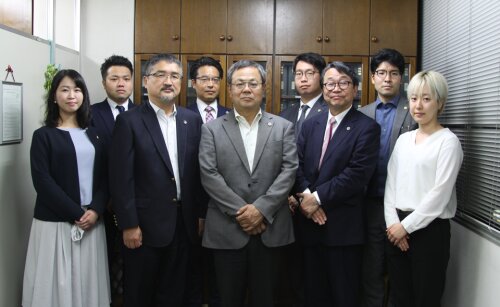Best Creditor Lawyers in Shizuoka
Share your needs with us, get contacted by law firms.
Free. Takes 2 min.
List of the best lawyers in Shizuoka, Japan
About Creditor Law in Shizuoka, Japan
This guide provides a clear, practical overview for creditors and people dealing with creditor issues in Shizuoka Prefecture, Japan. In Japan the rights and duties of creditors and debtors are governed by national laws that apply throughout the country, while local courts and offices in Shizuoka handle procedures and enforcement on a regional basis. Common creditor activities include asserting contractual claims, collecting unpaid debts, pursuing enforcement after court judgments, and participating in insolvency procedures when a debtor is insolvent.
Why You May Need a Lawyer
Creditor matters often involve legal complexity, time limits, and procedural steps that must be handled correctly to protect your rights. You should consider legal help if you face any of the following situations:
- Difficulty collecting payment on a commercial invoice or personal loan
- Disputed debt - the debtor contests the amount or existence of the debt
- You need to obtain a court judgment to enforce collection
- Debtor is insolvent - possible bankruptcy or civil rehabilitation proceedings
- Complex cross-border elements or foreign counterparties
- Risk of improper or illegal collection practices by others
- Need for provisional remedies - for example, to freeze assets temporarily
- Negotiating settlement terms, structured repayment, or security interests
A lawyer can advise on strategy, prepare demand letters, file claims, represent you in court, apply for compulsory execution measures, and negotiate or represent you in insolvency procedures.
Local Laws Overview
Although creditor law in Shizuoka is based on national legislation, several key legal frameworks are particularly relevant:
- Civil Code - Governs contracts, obligations, and basic creditor-debtor relationships. It sets out how debts arise, performance rules, and remedies for breach of contract.
- Code of Civil Procedure and Civil Execution Act - Regulate civil litigation, judgment procedures, and enforcement. After obtaining a judgment, creditors use these procedures to enforce rights through seizure of assets, bank account garnishment, and public auction of property.
- Bankruptcy Act, Civil Rehabilitation Act, and Corporate Reorganization Act - Provide structured procedures when a debtor cannot pay debts. Creditors may file claims in insolvency proceedings and participate in creditor committees or rehabilitation plans.
- Consumer Contract Act and related consumer protection rules - Protect individual consumers from unfair contract terms and improper business practices. Creditors dealing with consumer debts must ensure compliance with these protections.
- Money Lending Business Act and related regulations - Govern licensed moneylenders, interest rates, and lending disclosures. If you are a creditor engaged in lending activities, you must comply with licensing, disclosure, and interest-rate rules.
- Statutes of limitation and prescription - Time limits apply for bringing claims. Different types of claims and circumstances may have different limitation periods. Missing a limitation deadline can bar enforcement, so timing is critical.
Enforcement methods commonly used in Shizuoka include voluntary payment demands, filing a suit at the appropriate district or summary court, obtaining a judgment, and then requesting compulsory execution. Local courts - for example the Shizuoka District Court and relevant summary courts - handle case filing and enforcement processes for matters in their territorial jurisdiction.
Frequently Asked Questions
What should I do first when a debtor in Shizuoka fails to pay?
Start by reviewing the contract and payment records. Send a clear written demand specifying the amount due, basis for the claim, and a reasonable deadline for payment. Keep records of all communications. If the debtor does not respond, consider legal consultation to assess filing suit or using mediation.
Do I need a court judgment before I can seize a debtor's assets in Shizuoka?
Generally yes - you usually need a court judgment or other enforceable title to apply for compulsory execution measures like seizure of bank accounts or property. There are limited provisional remedies that can be sought before trial in specific circumstances, but these require satisfying legal conditions and court approval.
Can I garnish a debtor's salary in Japan?
Garnishment of wages is possible through execution procedures, but it is subject to statutory protections for a debtor's subsistence and procedural rules. A court or enforcement office will calculate exempt amounts and apply required procedures, so legal guidance is recommended when pursuing wage garnishment.
What happens if the debtor files for bankruptcy or civil rehabilitation?
If a debtor enters formal insolvency proceedings, creditor remedies shift into those procedures. You must file a proof of claim within the deadlines set by the bankruptcy or rehabilitation rules. Individual enforcement actions typically stop after commencement of proceedings, and creditors participate in distribution or rehabilitation processes according to priority rules.
How long do I have to bring a claim in Japan?
Limitation periods vary based on the nature of the claim and contractual terms. Different causes of action may carry different limitation periods. Because missing a limitation period can prevent recovery, consult a lawyer promptly to determine applicable deadlines for your specific case.
What costs should I expect when taking legal action in Shizuoka?
Costs commonly include court filing fees, service fees, attorney fees, and expenses for enforcement measures. Attorney fees depend on the lawyer and the complexity of the case. Ask a prospective lawyer for a clear fee estimate, including possible contingency, hourly, or fixed-fee arrangements.
Can I use mediation or settlement instead of litigation?
Yes. Mediation, settlement negotiations, and alternative dispute resolution can be quicker and less expensive than litigation. Courts also offer mediation services for civil disputes. A lawyer can help structure settlements, draft binding agreements, and ensure enforcement mechanisms are in place.
How do I find a qualified lawyer in Shizuoka?
Look for a lawyer experienced in debt collection, civil litigation, and insolvency matters. The local bar association and Japan Legal Support Center can provide referrals and initial consultation options. Meet potential lawyers to discuss experience, approach, and fees before engaging representation.
Are there protections against unfair or illegal collection practices by creditors?
Yes. Debtors have rights against unlawful or harassing collection practices. Laws and guidelines restrict abusive conduct by creditors. If you are a debtor facing such conduct, document incidents carefully and seek legal or consumer-advice support. If you are a creditor, ensure your collection efforts comply with legal and ethical standards.
If the debtor is a business outside Shizuoka - can I still enforce here?
Yes, but jurisdiction and practical enforcement depend on the debtor's location, where the contract was performed, and where assets are located. If the debtor has assets or business presence in Shizuoka, local courts and enforcement offices may be used for execution. Complex cases may require multi-jurisdictional strategy and legal advice.
Additional Resources
When seeking help or more information, consider the following types of local and national resources:
- Shizuoka District Court and local summary courts - for filing claims and enforcement procedures
- Shizuoka Prefectural Government consumer affairs sections and municipal consumer centers - for consumer disputes and mediation assistance
- Shizuoka Bar Association - for lawyer referrals and information on legal services
- Japan Legal Support Center (Houterasu) - offers information and practical assistance on legal procedures and low-cost consultations
- Ministry of Justice - publishes information on civil procedures, enforcement, and insolvency laws
- National and local insolvency administrators and certified trustees - for insolvency cases
Contact these organizations to get procedural information, referrals, or to confirm where to file a claim in Shizuoka.
Next Steps
If you need legal assistance with creditor matters in Shizuoka, follow these practical steps:
- Gather documentation - contracts, invoices, payment records, communications, and any security agreements or collateral documents
- Document attempts to collect - dates, methods, and debtor responses
- Preserve evidence - keep originals and copies, and maintain a clear file
- Contact a qualified lawyer - request an initial consultation to review the case, determine deadlines, and discuss likely costs and strategy
- Consider negotiation or mediation - these options can resolve disputes faster and at lower cost than court proceedings
- If litigation is necessary - prepare to file a claim promptly to protect your rights and deadlines
- If insolvency appears likely - act quickly to file claims and participate in creditor processes
- Follow legal advice on enforcement steps and avoid informal or extra-legal measures
Acting promptly and with appropriate legal guidance will improve your chances of recovering debts and protecting your interests in Shizuoka. If you are unsure where to start, contact the local bar association or legal support organization for referral to an experienced creditor-law attorney.
Lawzana helps you find the best lawyers and law firms in Shizuoka through a curated and pre-screened list of qualified legal professionals. Our platform offers rankings and detailed profiles of attorneys and law firms, allowing you to compare based on practice areas, including Creditor, experience, and client feedback.
Each profile includes a description of the firm's areas of practice, client reviews, team members and partners, year of establishment, spoken languages, office locations, contact information, social media presence, and any published articles or resources. Most firms on our platform speak English and are experienced in both local and international legal matters.
Get a quote from top-rated law firms in Shizuoka, Japan — quickly, securely, and without unnecessary hassle.
Disclaimer:
The information provided on this page is for general informational purposes only and does not constitute legal advice. While we strive to ensure the accuracy and relevance of the content, legal information may change over time, and interpretations of the law can vary. You should always consult with a qualified legal professional for advice specific to your situation.
We disclaim all liability for actions taken or not taken based on the content of this page. If you believe any information is incorrect or outdated, please contact us, and we will review and update it where appropriate.









